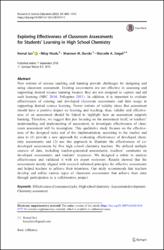Exploring Effectiveness of Classroom Assessments for Students' Learning in High School Chemistry
Abstract
New notions of science teaching and learning provide challenges for designing and using classroom assessment. Existing assessments are not effective in assessing and supporting desired science learning because they are not designed to capture and aid such learning (NRC2014; Pellegrino2013). In addition, it is important to evaluate effectiveness of existing and developed classroom assessments and their usage in supporting desired science learning. Newer notions of validity stress that assessment should have a positive impact on learning and teaching; thus, validity and effectiveness of an assessment should be linked to highlight how an assessment supports learning. Therefore, we suggest that just focusing on the assessment itself, or teachers' understanding and implementing of assessment, to investigate effectiveness of classroom assessment will be incomplete. This qualitative study focuses on the effectiveness of the designed tasks and of the implementation, according to the teacher and aims to (1) provide a new approach for evaluating effectiveness of developed chemistry assessments and (2) use this approach to illustrate the effectiveness of co-developed assessments by five high school chemistry teachers. We utilized multiple sources of data, including teacher-generated assessments, teachers' comments on developed assessments, and students' responses. We designed a rubric to analyze effectiveness and validated it with six expert reviewers. Results showed that the assessments mostly aligned with research-informed principles for effective assessments and helped teachers to achieve their intentions. Our study recommends that teachers develop and utilize various types of classroom assessments that achieve their aims through participation in a collaborative project.


















